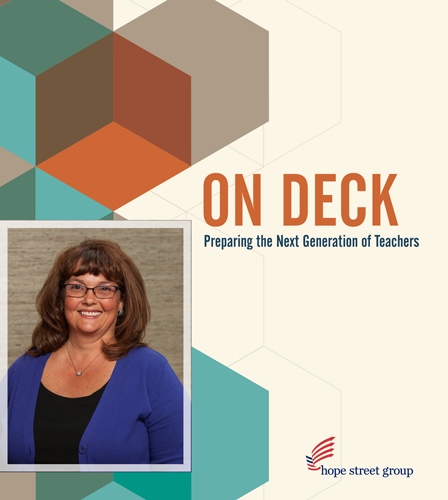The Future of Teacher Prep
The Future of Teacher Prep: What Current Teachers Dream of for the Next Generation
by Robyn Howton, English teacher at Mount Pleasant High School, member of the Rodel Teacher Council, and a Hope Street Group National Teacher Fellow
Back in 1991, I was the student teacher assigned to work with Mrs. Sargent at Triad High School in Troy, Illinois. I had spent less than 15 hours observing a classroom prior to my first day with Mrs. Sargent. Under her guidance, I put into practice the combination of content knowledge and teaching methods I had learned at Southern Illinois University – Edwardsville. I planned lessons aligned to content standards, learned what classroom management required in practical terms, graded papers, communicated with parents, and generally got my feet wet as a teacher. The next year, I was off to my own classroom.
Flash forward to 2016. How and what I teach has evolved with new technology and a better understanding of how students learn. Yet, the student teacher in my classroom is going through virtually the same teacher prep experience I did. So what’s wrong with this picture? Despite 25 years of research-based reform to public education, student teaching remains practically the same. It is time to examine our teacher prep programs and make meaningful changes so the next generation of teachers will be ready to meet the challenges of 21st century teaching.
As a Hope Street Group National Teacher Fellow, I took part in collecting input from teachers across Delaware and the country through in-person and virtual focus groups as well as an online survey. Based on the results of our research On Deck: Preparing the Next Generation Of Teachers and my personal experiences sharing my classroom with student teachers, my vision of the future of Teacher Prep Programs includes:
- More practical experience in the classroom! Hands down teachers said the student teacher process should include more time working in the classroom with students under the guidance of a master-teacher. A year-long experience modeled after the idea of a professional internship could benefit both the student teacher and school districts. Ideally, the student teacher internship would become a paid position, such as a medical residency, so a year-long time frame would be manageable. Student teachers would then spend the first year of their career working side-by-side with a master teacher.
- More hours observing a wide-range of schools. Education majors should start observing during their first education course and continue throughout their coursework. Observations should be tied to the subject being studied and provide a well-rounded view of all the challenges and opportunities teacher’s experience.
- Coursework focused on the skills a teacher needs to be effective. Specific courses in working with high needs and at-risk students in persistently low-achieving schools should be mandatory for every education major in order to prepare the next generation to work in the type of schools and classrooms in which first-year teachers often find themselves. Additionally, all student teachers should learn to use educational technology, create engaging standards-based lesson plans, and use data to inform instruction prior to their induction program in a district.
- Understanding of the standards. Teaching candidates should learn the current standards being used in their content or grade-level and how to unpack a standard in order to create standards-based lesson plans. Too often student teachers have no idea how to take a standard and create a usable lesson plan to teach it. Induction programs and mentors spend large amounts of time on what it means to teach the standards in practical terms.
- Clear accountability system for teacher-prep programs. Prior to choosing a teacher prep program, students should be able to find information on the success of the program as measured by teacher placement and retention. Nationally 13 percent of teachers cited teacher effectiveness as something they would want to know when evaluating teacher prep programs. My focus groups in Delaware clarified they were only interested if teacher effectiveness encompassed more measures than testing alone. More important on both a national level and to Delaware teachers were graduation rates (15 percent), job placement (38 percent) and teacher retention (55 percent).
I became a teacher because I truly believe education has the power to change our world by giving all children the opportunity to become successful adults. In order for education to reach its fullest potential, it needs teaching candidates who are prepared to teach all students.
Educators must continue to push for teaching to be seen as a true profession. Creating teacher prep programs that include the type of clinical experience and breadth of knowledge necessary to elevate the profession would be a major step in the right direction.
Working together, current teachers and professors, universities and school districts, and state and federal departments of education can reshape teacher prep so the next generation of teachers is ready to take on the challenges and respond to the opportunities of the future. Higher quality teaching candidates entering the workforce will translate into higher academic achievement and greater postsecondary success for all students—and isn’t that what we all want from our education system?
